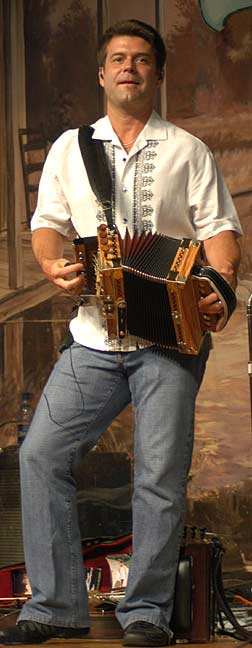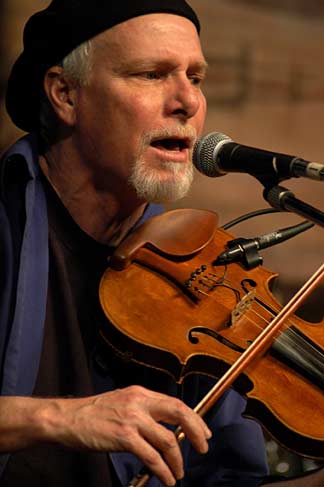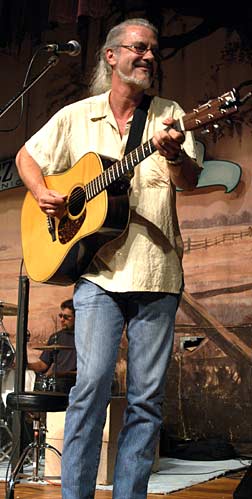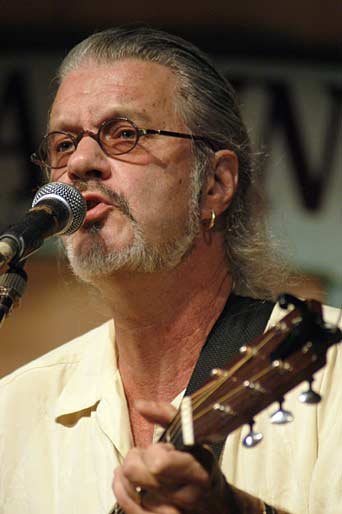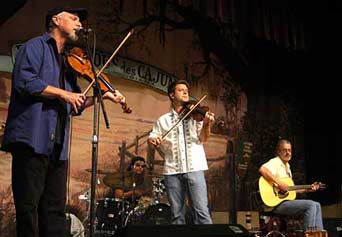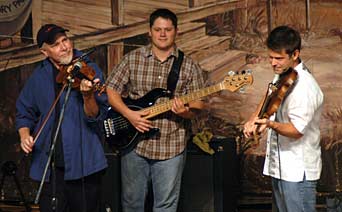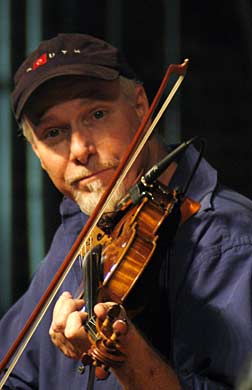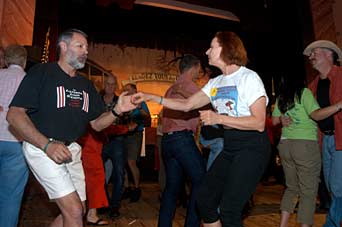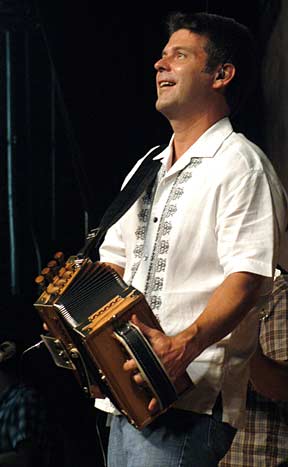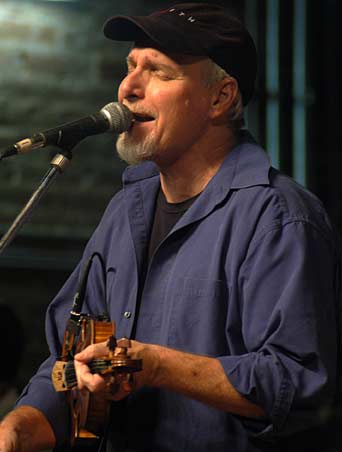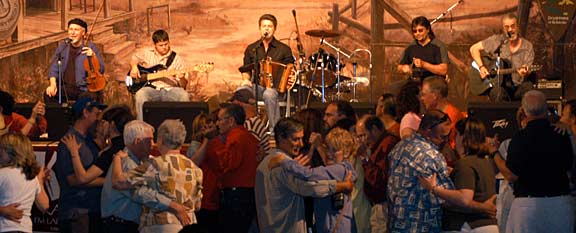|
Archive Files of Cajun, Creole, and Zydeco Musicians |
Steve Rileyand the Mamou Playboys |
Click here for high resolution photos of Steve Riley and the
Mamou Playboys on Flickr. 2005 Update: Mamou Playboys Release New CD: Dominos |
|
| Click here to go to the first page on Steve Riley.
|
Only a couple of years after releasing their superb 2003 CD Bon Rêve, Steve Riley and the Mamou Playboys have recorded another outstanding collection of songs rooted in tradition but full of surprise and excitement. Dominos serve as a metaphor for an idea that finds multiple expressions on the CD. Every action, every word can have a domino effect, for good or ill, extending across time and distance, from one generation to the next and beyond. In the title song, the imagery of dominos was originally inspired by the negative effects of family abuse, but the cover of the CD depicts a different kind of domino effect: the heritage passed from parents to children, from older musicians to younger ones, from a band like the Mamou Playboys to their audience. Inevitably that audience in Louisiana is likely to interpret the music in ways that fit our circumstances when the CD was released in early October 2005 in the wake of Hurricanes Katrina and Rita. Dominos have been cascading all over the state. Catastrophic damage in New Orleans and other parts of South Louisiana has decimated many key components of the state’s economy, dislocated nearly a million people, and created major challenges for less affected areas of the state where evacuees have sought refuge. The figurative language of the lyrics to “Dominos” by David Greely and Ray Bonneville has taken on an eerie reality: La tempête traverse la mer La lame touché toi et moi Steve Riley’s “Land of Strangers” was inspired by his loneliness while missing Louisiana, especially his daughter, when he was performing overseas. But in October 2005, the song also sounds, in a way, like a lament for a lost Louisiana, where familiar landscapes are gone, replaced by a strange country that no longer feels like home. For those returning to regions devastated by winds and flood, that experience is very real. For the rest of us, these are strange times. Our homes are intact, but most of us have close ties to those who are now homeless, and the task of rebuilding the regions that lie in ruins seems overwhelming. But we can do it together. Just as the Acadian exiles found the strength to settle a new land and the former African slaves persevered in their struggle for freedom and justice that continues today, their sons and daughters will push forward. With help from other American citizens as well as from friends in Canada, France, and elsewhere who feel a special tie with Louisiana, the dominos are already cascading toward a brighter future. As Sam Broussard sings in the CD’s final song, “Rivière de temps,” his ancestors speak through him with a voice that tells him never to give in: “Ça vaut la peine, tiens lé bien / La tête aussi dure que le monde.” The rest of the CD offers ample proof of why the heritage of South Louisiana has endured and still flourishes: a medley of Ardoin family songs combining “Fais pas tout ça,” “Midland Two-Step,” and “Quoi faire,” D.L. Menard’s “The Bachelor’s Life,” Canray Fontenot’s Coulée Rodair,” “Éspère jusqu’à je finis de pleurer” by Nolan Dugas, father of Mamou Playboys’ drummer Kevin Dugas, a new-old swing version of “Tu peux cogner,” inspired by a thirties band from Houston, a Varise Connor mazurka with lyrics provided by David Greely, a beautiful interpretation of “Les clefs de la prison” sung in a cappella harmony, a medley of Dennis McGee fiddle tunes, David Greely’s musical setting for another poem by a slave from St. Martinville (Greely and Sam Broussard have previously made songs from three other poems by the slave Pierre as transcribed by Dr. James Broussard, Sam Broussard’s great uncle), and three more instrumentals: “Waxia,” Greely’s “Ramificajuns,” and Steve Riley’s tribute to his daughter, “Elise.” And there is one final musical domino, a coda to “Rivière de temps” in the form of a field recording made by Barry Ancelet of five-year-old Steve Riley singing “J’ai passé devant ta porte” for his grandfather, Burke Guillory. Though he died when Riley was only seven, the memory of his grandfather and the discovery later on of his grandfather’s Cajun records by the Balfa Brothers and Marc Savoy pushed Riley toward his career as a Cajun musician. As he told journalist Herman Fuselier (in an article in The Times of Acadiana), "He was a very powerful presence in my life and he still is. I think he's still with me. I can still feel his presence." With the release of Dominos by Rounder Records, the Mamou Playboys become the first Cajun band to produce a combined CD/DVD. The video on the flip side was shot by Bennet Rhodes and Wilson Savoy (their company is called Almena Pictures (www.almenapictures.com), with Wilson, son of Marc and Ann Savoy, handling the video and sound editing. Included are performances of three songs from the CD, plus “Bon rêve,” which, along with “Éspère jusqu’à je finis de pleurer,” were filmed at Pat’s in Henderson, La., before a really lively crowd of dancers and fans. Also included are comments by Barry Ancelet about the band and their music. Dominos was recorded by Dirk Powell (who performs on two cuts) at his Cypress House Studio and released by Rounder Records. Featured on this page are photos taken Oct. 8, 2005, during a CD release event at the Liberty Theater in Eunice, postponed from Sept. 24, the day that Hurricane Rita hit Louisiana. The band played all of the songs from the CD and then, with the crowd clapping and singing the refrains, closed with “Allons danser” and “Bon rêve.”
|
| Most of the photos of Steve Riley on accordion and fiddle, David Greely on fiddle, Sam Broussard on guitar, Brazos Huval on bass, and Kevin Dugas on drums were taken Oct. 8, 2005, at the Liberty Theater in Eunice. The top photo in the left column of David Greely , the photo of dancers immediately above, and the bottom photo below of dancers were taken when Cycle Zydeco rode through Eunice and visited the Liberty in April 2005. | |
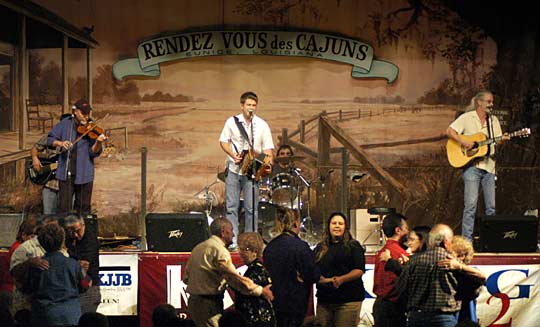
|
|
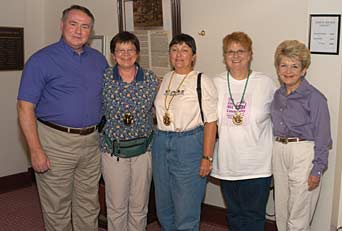
The positive domino effect in action
helping to restore Louisiana
Indiana volunteers who made a delivery of hurricane
relief supplies to the City of Eunice donated by the University of
Indiana-Kokomo and by Indiana churches attended the Oct. 8 performance by
the Mamou Playboys. They are, from second left, Becky Jones, Donna Miller,
and Sue Ellen Payne. They are flanked by LSUE Chancellor William Nunez and
his wife, Adele Nunez. The three also helped out at evacuee shelters in
Eunice and at the Cajundome in Lafayette. Before coming to LSUE, Nunez was
vice chancellor for academic affairs at IUK.
Updated 10-13-05
All photographs and text by David Simpson.
